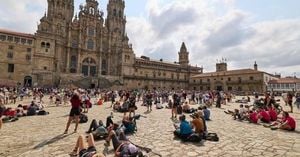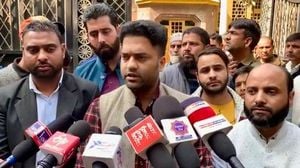Under the shadow of political controversy and rising civil unrest, Mozambique has descended deeply post-election turmoil. Following the October 9 presidential elections, which saw ruling party Frelimo's candidate Daniel Chapo declared the winner amid accusations of fraud, the nation has been engulfed by violence and protests.
Human rights experts from the United Nations have expressed alarm at the wave of violence and repression against demonstrators, urging the Mozambican government to end the violence and hold accountable those responsible for unlawful killings. The protests, sparked by accusations of electoral malpractice, have led to at least 30 confirmed deaths, including children, and over 200 injuries, alongside the arrest of around 300 demonstrators.
The disputed elections, characterized by reports of significant irregularities, have generated considerable dissent among the population, with accusations of vote rigging fueling public outrage. The electoral commission claimed Chapo received 71% of the vote, but these results are firmly contested by the opposition, particularly independent candidate Venancio Mondlane, who asserts he was the rightful victor.
After the election results were announced, protests erupted across the country, transforming peaceful demonstrations to violent confrontations between police and demonstrators. The government’s response has included the deployment of military forces and the use of tear gas, rubber bullets, and excessive force against those peacefully assembling. This heavy-handed approach has not only stifled public expression but has also led to dangerous repercussions for those involved, worsening the overall humanitarian situation.
Maputo's streets, usually vibrant, have fallen eerily silent at times, with many opting for 'panelaco' protests — pot-banging demonstrations aimed at voicing discontent without provoking violent reactions from security forces. These nightly gatherings signify unity and resistance among residents, as citizens from diverse backgrounds join together against what they perceive as electoral injustice.
Despite the government's ban on protests, demonstrations continue, including attempts to block economically important locations like border posts and provincial capitals. The Interior Minister, Pascoal Ronda, labeled the protests as acts of terrorism, claiming they disrupt daily life and threaten peace. "These are acts of subversion and terrorism," Ronda stated, emphasizing the need for restoration of order.
The backdrop of this violence resonates with historical echoes; many citizens fear the potential for civil conflict reminiscent of the country’s war-torn past. Teachers and students alike complain about harsh police presence and civil liberties under threat, with instances of military vehicles patrolling the streets becoming commonplace. Internet and mobile connectivity have also faced restrictions, with various outages attempting to diminish public discourse and criticism of the government.
The humanitarian crisis resulting from these unrests has escalated. Commerce has slowed, with businesses reporting losses due to forceful crackdowns and disruptions caused by protests. Grocery stores have encountered shortages as supply chains falter, leading to growing anxiety around food security. The Southern African Development Community (SADC) has convened to address this cross-border crisis, indicative of the far-reaching ramifications of the unrest.
Many Mozambicans are becoming increasingly engaged politically, with a significant portion expressing their disenchantment with the ruling elite's perceived unresponsiveness to the people's needs. Social media attacks against journalists and human rights activists seeking to document the protests are common, intensifying fears of oppressive state control. Observers now label this restless discontent not just as dissatisfaction over electoral issues, but as part of broader economic despair stemming from years of stagnation and political immobility.
The crystal clear message from human rights advocates is the urgent call for the forced return to democratic norms, accountability for violence, and alleviation of restrictions on civil liberties. Until the Mozambican authorities heed these calls, the situation remains one of great tension and potential upheaval, posing serious threats to the country's fragile democracy.
Moving forward, the need for international monitoring and strong local advocacy will be pivotal for restoring trust and security among Mozambique's citizens, as they navigate the turbulent waters of post-election discontent. The hope remains for the nation's leaders to embrace democratic principles and put the people's interest at the forefront of governance.



